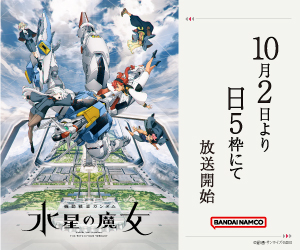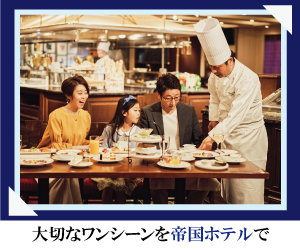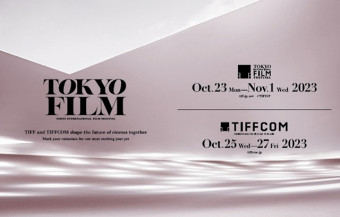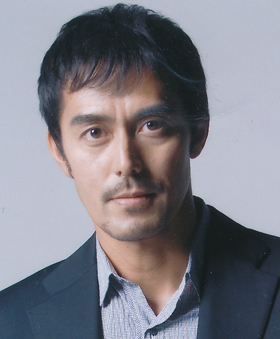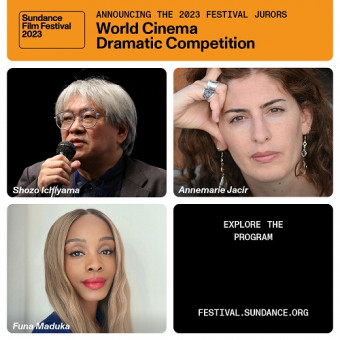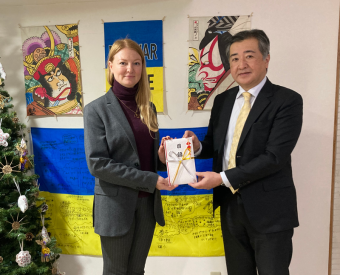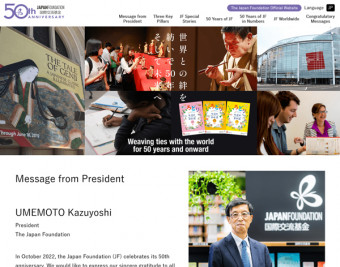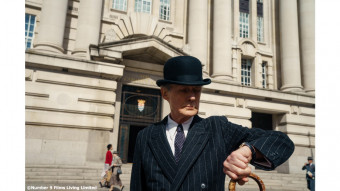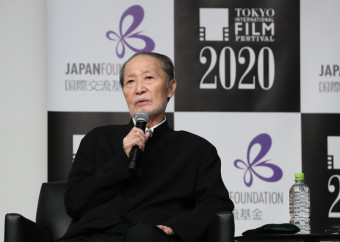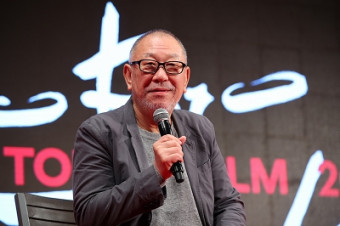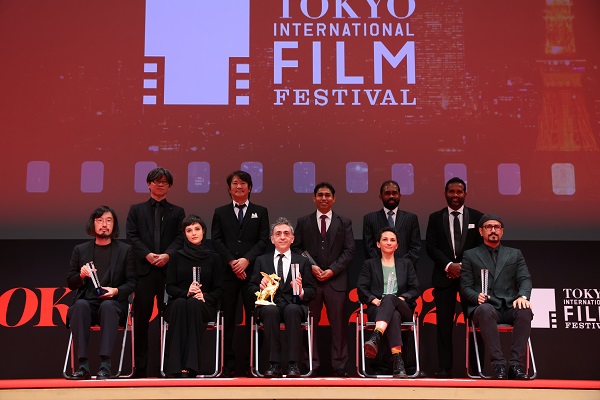
The 35th Tokyo International Film Festival (TIFF) concluded on November 2, following 10 days of screenings and events at the festival’s expanded venues in the Hibiya-Marunouchi-Yurakucho-Ginza area. The festival screened 169 films, an increase over the 126 last year, with 59,541 admissions (nearly double that of last year) and another 50,842 attending related events.
During the Closing Ceremony at Tokyo International Forum, winners were announced for a range of awards, culminating in the Tokyo Grand Prix, The Governor of Tokyo Award, which comes with 3 million yen in prize money.
The ceremony began with a video of highlights from the festival, including footage and snapshots of indoor and outdoor stage appearances, Q&A sessions, master classes, symposia and TIFF Lounge sessions.
TIFF Chairman Ando Hiroyasu and Stephen Woolley, producer of Living, the British reimagining of Kurosawa Akira’s Ikiru (and the 35th TIFF Closing Film) then came onstage to present a richly deserved Lifetime Achievement Award to Nogami Teruyo, in recognition of her extraordinary career and contributions to Japanese film. Nogami first worked with Kurosawa Akira on his film Rashomon as a script supervisor in 1950, and went on to participate on all his films after Ikiru in a variety of crucial roles.
Presenting a huge bouquet of flowers to the legend, Woolley commented, “This is a wonderful moment for me. When I first saw Throne of Blood, I was 14 and thought it was the best version of Shakespeare’s Macbeth I’d ever seen. To think that you worked on so many [Kurosawa] films! I’m very honored to be here to present this fantastic award to such an esteemed person.”
Nogami responded, “Thank you so much for the beautiful flowers. I’m 95 years old, so I’m just glad to be alive. I love films, and the expression of films has continued because of many directors, for which I’m very grateful. Mr. Ando is a wonderful person and this has become a wonderful festival because of him.”
In the second year of the Amazon Prime Video Take One Award for short films, Yukisada Isao, jury president, speaking on behalf of himself and fellow jurors Hanno Yoshihiro, Hayakawa Takayuki, Heya Kyoko and Takiuchi Kumi. “The Amazon Prime Video Take One Award is a dream come true that gives new directors a chance to bring their films to life. It’s unfortunate that we couldn’t find a winner. Each piece has its merit, but many didn’t connect with the world. None of the works took imaginative leaps. Although they might not be worthy of an award, I hope these finalists will someday be recognized. ”
He continued, “It’s not the case that nothing was worthy, there were works that showed a promising future, and I would like to mention Yo Enen’s The refrigerator thief, which had a certain spark. But there was a clear difference in ability between last year’s and this year’s directors. Amazon Studios should work with creators who have listened to harsh opinions, and we hope that this result will lead to a winner of the award next year.”
In the Asian Future section, jury member Saito Ayako, speaking on behalf of herself and fellow jurors Soros Sukhum and Nishizawa Akihiro, noted, “We would like to congratulate the 10 films that were selected for the 10th anniversary of this section. Selecting one film from among 10 films with such diverse cinematic backgrounds, including art cinema, slow-motion cinema, slow cinema, genre films and experimental films, each of which tackles unique expressions and themes, was extremely difficult. All of the films, with their strengths and weaknesses, showcased images of societies and cultures that we do not often get to see through the delicate visions that only cinema can provide, and presented themes and narratives that are directly or indirectly connected to the now in which we live. The selection process came down to two films and engendered serious debate. It was an honor to consider these films that demonstrated the passion and courage of the filmmakers.”
Nishizawa then announced that the Asian Future Best Film Award would go to the Iranian film Butterflies Live Only One Day, “a film that intrigued us and showed us a tremendous leap forward.” Iranian director Mohammadreza Vatandoust came on stage to accept the trophy and commented: “Kombanwa and arigato gozaimasu. I would like to thank the film festival and the jury, as well as expressing gratitude to all those who helped me make the film. Highly artistic films are rarely rewarded these days at film festivals, and I’m very grateful to be recognized for this. As a director, we deal with social issues in the language of cinema, and I would like to dedicate this award to the wonderful women of Iran. I pray for peace and a world without war.”
After a video introduction to the 15 films included in the International Competition, TIFF Chairman Ando Hiroyasu then came on stage to announce the winner of the coveted TIFF Audience Award, by the window. Japanese director Imaizumi Rikiya was on hand to address the audience, and commented: “It’s an honor to receive such a prestigious award. This is my second time in the TIFF Competition. I make films about small problems that people may have. In novels and films, creators tend to take up major issues, but in my work, my protagonists struggle with minor problems and aren’t able to act. I will carry on with my efforts and do what I can do in my small way.”
Juror Yanagijima Katsumi, announcing the Award for Best Artistic Contribution, commented: “In this film, children born from unwanted pregnancies are sold to wealthy foreign couples. An autobiographical film based on the director’s own experiences, it depicts a family living in the midst of the social realities that the country currently faces. The story was captured and expressed in impressive images, with symmetrical compositions of character and it made us think about what human morality is.”
Peacock Lament director Sanjeewa Pushpakumara then came on stage and told the audience, “I would like to thank the Japanese government and the Japanese people for their tremendous support to the Sri Lankan people in this difficult time. I want to thank my producers, Amil Abeysundara and Suranga Handapangoda, and invite them to the stage. I also want to thank my wonderful coproducers and sales agent in Italy. And I want to thank my wonderful cast and all the crew for their undying support, taking a risk to make this film during the COVID pandemic. I also want to thank my mother, my siblings, my wife and her family. Finally, I want to remember my late sister, whose life this film is based on. I want to dedicate this film to all the Sri Lankans because we have free education. We all learn because of their tax money. Finally, to Ichiyama Shozo. He’s supported my films from the beginning, and without him, I would never come to Tokyo.”
Juror Shim Eun-kyung then came onstage to announce the Best Actor Award. The Korean-born actor said, “Before announcing the award, I would first like to express my deep condolences for the Itaewon tragedy that occurred on October 29. May their souls rest in peace.
“Now, I would like to announce the Best Actor Award. In this work, an ordinary couple confront the difficulty of relationships, that resist regardless of time and region, and the painful situation that it brings, with great love. All of the jury was overwhelmed by Denis Menochet in The Beasts.”
Best Actor Award winner Denis Menochet (star of France/Spain film The Beasts) spoke to the audience via video: “Domo artigato gozaimasu. Hello Tokyo. Hello film festival, I love this festival. It is a huge honor and I am humbled by that. I love Japan, I love the country, I love the culture and…I think if the world was more Japanese,’ it would be a better place, definitely. So I feel very humbled by this prize. I can’t be with you, I’m in Montreal right now, as you can see [he swung his camera to the scene outside the window]. But thank you so much. Arigato gozaimasu. I can’t wait to come back and visit. One day (I’ll) make a movie in Japanese, I would love that! Thank you so much!”
Shim Eun-kyung also announced the Best Actress Award noting, “Between the bourgeois under a dictatorship and the revolution, one woman gets caught up in a wave of politics. She is very delicately and elegantly portrayed as she struggles between her own true values and reality. It is the unanimous result of the jury for the performance of Aline Kuppenheim in 1976.”
Best Actress Award winner Aline Kuppenheim (star of Chile/Argentina/Qatar film 1976), speaking via video, said: “Konnichiwa. Good afternoon. Good evening to everyone present at this ceremony. I am very happy, very surprised, very grateful, and most of all very honored, to receive this wonderful award you are giving me. Many thanks to the festival, and to the jury, and I would especially like to thank, yet again, my director, Manuela Martelli, for having entrusted me with this character, and all the wonderful team behind 1976, my colleagues, for their impeccable and loving teamwork. I really wish I could be there with you, but I am literally on the other side of the world. But still, from very far, from Santiago, Chile, I send you a warm embrace. Honto ni arigato gozaimasu.”
1976 director Manuela Martelli, present in Tokyo, also came on stage to say, “I want to thank the festival for giving us the chance to show the film here and for me to be here visiting this wonderful country and these amazing people. Thank you to all the festival workers and volunteers. When I was 10 years old, I interviewed Aline Kuppenheim because I really liked her as an actress. And now I’m here accepting this award for her. Thank you so very much.”
Juror Marie Christine de Navacelle then announced a Special Jury Prize for the Iranian film World War III. She commented, “It is a black comedy where we go from tears to laughter. It’s also the tragedy of a simple man fighting, in his own way, the absurdity of our world today. It is both sad and very funny, and deeply entertaining.”
Speaking on behalf of director Houman Seyedi, one of the film’s stars, Mahsa Hejazi, came onstage and addressed the audience. “Unfortunately, the director couldn’t be present, but I’ve received this message from him. Please allow me to read: ‘For Japan, this world is a mountain, and our actions are a call that will come back as a voice. Voices have no borders, voices can be heard, my voice will travel from Teheran and you will hear that. I cannot be with you at this moment, not because I did not want to be. They did not let me. But my voice is there. Not to be able to be with you, not to be able to see your culture, traditions is painful for me. But I have heard your voices for many years now. Every time I read a haiku, every time I open a book by Murakami Haruki, or Kazuo Ishiguro. Every time I watch Kurosawa’s work, I knew you well. And soon I will fly to meet you all. May peace be on the world. Hope to see you soon, and I send my deepest gratitude to you for accepting us.”
Juror João Pedro Rodrigues announced the Award for Best Director, commenting that “This is a film that looks into a brutal tradition, neither to folklorize it or demonize it, but to understand both the remains and the contradictions of this ancient world in our contemporary present: its moral ambiguities but also its incongruous subtleties. Only a brilliant director could find the right balance of complex storytelling, master scriptwriting, beautiful mis-en-scene, and the exquisite direction of the actors. The award for Best Director goes to Rodrigo Sorogoyen for The Beasts.
Jury President Julie Taymor then described the winner of the Tokyo Grand Prix, The Governor of Tokyo Award, The Beasts: “An extraordinary film that is at once a psychological thriller, a deeply moving love story, and a multilayered commentary on class divide, xenophobia, and the gulf between the city and rural survival, this is truly a masterpiece of cinema. Not only the screenplay, a complex, gripping tale based on real events, but it’s also excellent on every level: the acting, direction, music, cinematography. As the tension ramps up, and we feel the inevitable violence about to erupt, we are able to empathize with both sides of the conflict with the help of scenes rich in dialogue and time. The director has put together a highly charged and emotional film. They show us the beasts of burden are men in battle with men.”
Tokyo Governor Koike Yuriko came on stage to present the award to Alberto Calero Lugo, a representative of the Latin Bean Film Festival, a TIFF collaborator. She then commented: “On behalf of the Tokyo Metropolitan Government, I would like to express words of congratulations to the winner of the Tokyo Grand Prix, The Governor of Tokyo Award, the director and all the crew. Each year, new talent is born and comes to the world stage from Tokyo. The theme of the 35th TIFF is ‘Leaping Forward,’ and that’s what the festival symbolized. The world is in a very difficult situation, with climate crises and other conflicts, as well as the COVID pandemic. In order to proceed to a bright future, the diversity of culture is crucial. Art has the power to connect the minds and hearts of the people. We are hoping for a society that can nurture everyone’s individuality.”
The Beasts’ Spanish director, Rodrigo Sorogoyen, then addressed the audience via video, saying, “Hi Tokyo, hi everyone, I’m Rodrigo Sorogoyen, director of As Bestas (The Beast). Wow, I’m very happy for these two awards, the Best Director and the Best Film, the Tokyo Grand Prix. It’s incredible, a big honor, huge honor to receive these awards. Thank you, thank you for the festival, thank you for the jury, and domo arigato. I’m very happy. I can’t be there with you, it’s a pity but I can’t. I hope you enjoy the film, enjoy the festival, and enjoy the wonderful city. I’m very happy. Ciao, buenos noches, Tokyo.”
Julie Taymor then joined her fellow jurors on the stage and spoke for all of them as they concluded their duties. “As the president of the jury for the 35th Tokyo Film Festival,” said Taymor, “I had the honor to preside over discussions concerning vast array of films from all over the world. The jury were taken on a journey through stories from North Macedonia, Tunisia, Vietnam, Sri Lanka, Spain, Italy, Chile, Kazakhstan, Tajikistan, Lebanon, Israel, Iran and Japan. To see the dark and light side of cultures so different from our own, is the point of a festival like this. It is wonderful to experience the voices of new filmmakers with the passion to tell their stories and bring them to the attention of the world. And it is also wonderful to see experienced filmmakers still in the game creating new works of imagination through the struggle of a very real COVID time, and the ever-difficult grind of raising financing.”
The producer of the 35th TIFF Closing Film, Living, Stephen Woolley, was the invited to introduce the film. “Thank you so much for inviting us to your festival,” he said. “It’s a real privilege and thrill to be here, because this is a reimagining of the wonderful masterpiece Ikiru. The film was written for the star Bill Nighy by Kazuo Ishiguro. When Mr. Ishiguro suggested that Bill Nighy should star in a remake, I told him, ‘The only one who could write it is you.’ As you will see, he wrote a very beautiful screenplay which owes everything to the inspiration of the original Kurosawa film, and yet it’s very different. ”
“But it joins [postwar] London and Tokyo together and shows the similarities between the two cities, as well as the stoicism of both the British and the Japanese, as well as the humor that was so essential to keep up people’s spirits. I want to thank Toho, which made the original film as well as so many other masterpieces with Mr. Kurosawa, for supporting the film when we only had a script, an actor and a director. We’ve shown the film at many festivals, but this is a very special screening here in Tokyo. I feel as if the film has finally come home.”
The audience was then treated to a long video message from Bill Nighy, Oliver Hermanus and Kazuo Ishiguro. Nighy, calling Kurosawa “the most wonderful filmmaker in the history of film,” mentioned how “profoundly flattered” he’d been to hear that a “Nobel Prizewinning writer was going to write a screenplay for me.” Ishiguro mentioned that Ikiru had had a profound influence on him from childhood, and its message of doing something well “is an important universal message. The film exceeded my expectations, and I had high ones.” Noted the director, “I tried very hard to imagine the feelings of audience members. It has a very important message, particularly in today’s world.”
TIFF Chairman Ando Hiroyasu then made closing remarks. “We were blessed with perfect weather for the past 10 days. We increased the number of venues, the number of films screened and doubled the number of audiences, and many more overseas guests have been able to attend. All of these have enhanced the glory of the festival. Japanese work of art is not just limited to Mr. Kurosawa’s work, and as our guests have repeatedly said, it is among the best in the world. The power of the nation has declined and people are losing confidence. But when it comes to works of art and culture, I believe we can compete with other countries. TIFF would like to serve as a bridge to the rest of the world through cinema. Please continue to lend us your support. I now declare the 35th Tokyo International Film Festival closed.















